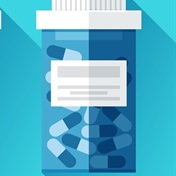
Researchers observed 72 medication mistakes at homes where 92 children with cancer were being cared for between November 2007 and April 2011.
"I was surprised by how much we found," said Dr Kathleen Walsh, the study's lead author from the University of Massachusetts School of Medicine in Worcester.
Previous research by Walsh and her colleagues found that children getting their cancer medicines at home are vulnerable to mistakes. Specifically, they found between 10% and 40% of oral chemotherapy treatments are missed.
For the new study, Walsh and her colleagues had nurses visit the homes of 92 children with cancer while their parents or guardians were giving them their medicine.
The children were from three medical centers around the US and - on average - about seven years old. Each child took about 10 medications at home. In most cases, mothers were the people responsible for the treatments.
Overall, the researchers reviewed information on almost 1 000 medications and witnessed children getting their medicines 242 times.
There were 72 medication errors recorded, including four that injured the children and 40 that had the potential to cause injury.
The four errors that caused injuries were from children not receiving the proper doses of their medications, which resulted in severe upset stomachs, pain and agitation.
And while 40 were listed as only having the potential to cause injury, some of those were also quite serious.
For example, Walsh told said that one family had been sprinkling chemotherapy on their child's food instead of giving the child the pill. Unfortunately, that made the treatment ineffective.
A group of doctors who reviewed the errors found better communication between families and physicians could have prevented over a third of the mistakes.
Walsh also said their new study probably underestimates the actual rate of medication errors among children with cancer, because they only recorded what they saw.
"The way we gathered the data limited the number of errors we were going to find to some extent," she said.
Prevention research is needed
Dr Christopher Landrigan, who wrote a commentary accompanying the new study, said it's not clear "what will be the best approach outside of the hospital."
Landrigan, an associate professor of medicine and paediatrics at Harvard Medical School in Boston, said that improving communication between doctors, pharmacists and families, and making the information on medication easier to understand, could help.
Last year, a study found that the information sheets included in many medications are too complex for the average person to understand.
"Clearly we are in need of proactive prevention strategies to reduce the error rate," said Dr John Maris, director of The Children's Hospital of Philadelphia's Center for Childhood Cancer Research.
Maris, who was not involved with the new research, said one possible strategy is for parents to receive text messages about correct drug doses. He also said the new study is a reminder that doctors shouldn't over prescribe medicine.
"There are a number of medications we use every day that can be dangerous if
we don't use them properly," said Walsh.
(Picture: woman taking pills from Shutterstock)




 Publications
Publications
 Partners
Partners















